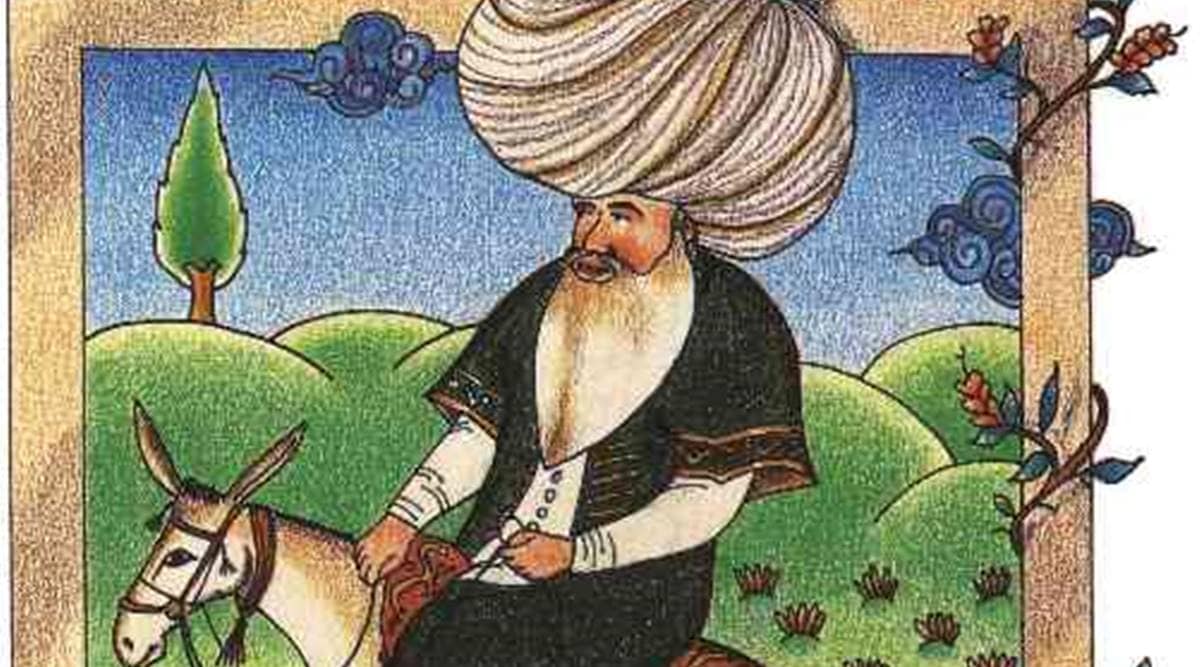 The festival on Mulla Naseeruddin is the outcome of a three-month online programme for children. (Source: Wikipedia)
The festival on Mulla Naseeruddin is the outcome of a three-month online programme for children. (Source: Wikipedia) In homes across Pune, a number of parents are going to be turning into costume designers, light technicians and backstage managers when Swatantra Theatre’s online children’s theatre festival opens on January 7. The four-day festival will feature stories of Mulla Naseeruddin, a literary figure from the 13th-century, whose tales are popular in several countries including India. A cast of 34 children will explore the wit and wisdom of Naseeruddin by performing stories such as Poshakh Ki Izzat (in which Naseeruddin is humiliated at a feast because he is wearing old clothes. As an answer, he goes away and returns wearing new clothes and begins to feed the clothes) and Badshah Ke Teen Sawaal (in which Naseeruddin solves three riddles of the king to the amusement of the courtiers).
“This is a way of helping children to understand the character as well as develop an interest in the dialect and the beauty of the Urdu language. Apart from performing, the children are designing posters of the play, sketching and painting themselves,” says Dhanashree Heblikar, who has been Creative Director at Swatantra Theatre and Films for 14 years and works closely with young people. The group was founded by her, Yuwaraj Shah and Abhijeet Choudhary. The festival follows several others during the pandemic that Heblikar and Choudhary, Director of the group, designed to keep children and young people engaged during the pandemic. “Our theatre group is packed with amateurs performers and students, many of who come to Pune to join this group and work in theatre,” says Heblikar, who is also a lawyer.
Swatantra Theatre has a full schedule of public performances through the year, and were to stage two classics of the stage, Jis Lahore Nahi Dekhya o Jamyai Nai and Taj Mahal Ka Tender, on March 14 and 15, respectively, when the coronavirus brought public gatherings to a stop. As audiences streamed in, members of the group told them that the shows were cancelled— a practice that was being carried out by theatre groups across the world simultaneously. The performers expected the lockdown to last three weeks only. “What happened next broke every theatre group in the world in some way. We had 80 young performers and, after the first shock, we desired to adapt. Even if we were not able to meet, we could continue to ideate, rehearse and learn through the digital medium,” says Heblikar.
The laptop became a part of the process as the team learnt to balance technology with creativity. “We started online festivals, workshops and dramatic readings and it was the only thread that kept us united to theatre, one another and ourselves as artists. We missed the theatre space but visually we were connected and it kept us going,” she adds.
The group soon realised that they were attracting a number of new audience members, who, otherwise, did not watch theatre in auditoriums. They polished their acts and began to push the bounds of performance and technology. One performance, Bicycle Girl, was drawn from a current news story, of Jyoti Kumari, a 15-year-old girl who bicycled from Gurugram in Delhi to Darbhanga in Bihar with her specially-abled father when the migrant crisis hit India. “The woman actor was in Odisha and the performer of the father was in Pune. Both of them got bicycles, painted these the same colour and arranged the lighting so that it appears that she is carrying him on the bicycle,” says Heblikar. “We learnt that the secret of success in the digital space depends on the ease and confidence with which you handle the technology,” she adds.
The festival on Mulla Naseeruddin is the outcome of a three-month online programme for children and is designed to include families of the young actors in the shows so that home spaces turn into performance arenas. “Ultimately, theater aims to bring people together and working with the spirit of one team,” she says. The six stories have been chosen to appeal to a wide age-group. There is Marizon ka ilaaj, showing Naseeruddin taking on some conmen who claim they can cure any disease; Kissa Andhe Bhikari Ka, where a king learns a lesson from a blind beggar thanks to Naseeruddin and Khoja ki Buddhimani, in which Naseeruddin comes up with an ingenious plan to catch a thief.